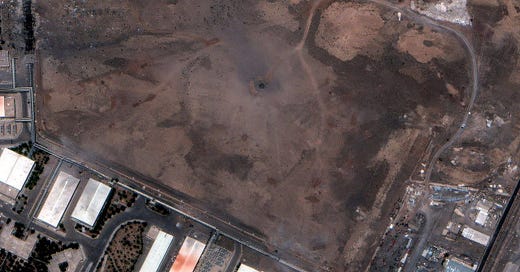This Saturday, June 21st, US President Donald Trump, announced that the United States had struck in Fordow, Natanz, and Isfahan. Those attacks came after a week of Israeli attacks in Iran.
Source: Wofnon
This Saturday, the US military carried out its first strikes in Iranian territory since 1979. The US airforce bombed the nuclear facilities of Fordor, Natanz and Isfahan. The attacks also involved submarines. This while the Israeli attacks continue. President Trump described the attacks as “very successful”, while he also added that “Tehran must make peace now”. He also said that he and Netanyahu worked as a team. Meanwhile, Iranian Foreign Minister said that the “outrageous” US attacks on Iran’s “peaceful nuclear installations” will have everlasting consequences. The International Atomic Energy Agency said there were no reports of increased radiation. Later Iran called for a United Nations Security Council meeting. The Islamic Revolutionary Guards Corps said that “war starts now”. After the strike, Trump and Israeli Prime Minister, Benjamin Netanyahu, held a phone call.
Source: Entre Guerras
On Sunday, UK Prime Minister, Keir Starmer, held a phone call with Trump. Both agreed that “Iran must never have a nuclear weapon”. The UK also moved its military equipment to the Middle East to “protect its interests”. On the other hand, UN nuclear watchdog, Rafael Grossi, said the strikes threatened a widening of the conflict, but also offered a return to diplomacy. The US ordered the evacuation of family members and non-emergency government personnel from Lebanon. Emmanuel Macron announced to hold an emergency security cabinet meeting.
The United States had been shifting its military aircraft to the Middle East for days. Meanwhile, Ayatollah Ali Khamenei had mentioned that any American attack would result in “irreversible damage”.
US President Trump ordered the killing of Iranian General Qassem Soleimani back in 2020.
Source: DD Geopolitics
This can mean that the US officially enters the war, exposing American interests to Iranian retaliation. Iranian options are from limited response, full scale war, or a combination of both. Also, Iranian proxys may not wait for an order from Tehran to retaliate, and take matters into their own hands. Another possibility could be the closure of the Hormuz Strait, increasing energy prices.
Experts have mentioned that oil prices could now fall if the nuclear weapons program was stopped, feeling there is no need for sanctions.
Trump’s allies are divided regarding his decision to strike Iran. The most hawkish members of his members and supporters have praised the decision, while others have shown disagreement with the decision. US Secretary of State, Marco Rubio, said that “the world is safer and more stable” after the strikes. They mention it is a departure from the promise of no more involvement in foreign wars, quoting that Israel struck first. Iran President, Masoud Pezeskhian, said that the US must “receive a response”. Tehran called for a Security Council meeting, describing it as a “blatant and illegal aggression”. Iranian Foreign Minister, Abbas Araghchi, accused Washington of breaching international law and added that Iran “reserves all options to defend its sovereignty, interest and people”. Israeli Prime Minister Benjamin Netanyahu praised Trump’s “bold decision”. Israeli opposition leader, Yair Lapid, said that “it was the right and correct for Israel, Israeli security and global security”, adding that Israel should now “wrap up” the war with Iran, because the main objectives have now been achieved”. The Houthis in Yemen have said that the US must “bear the consequences”. Danny Danon, Israeli representative at the UN, said that the entire world “should say thank you”. French President, Emmanuel Macron, distanced himself from the strikes. Russia condemned the strikes, calling them “irresponsible” and a “dangerous escalation”.
Cuba, Chile and Venezuela condemned the strikes, while Mexico called for dialogue. HAMAS also condemned the strike. Democratic legislators also criticized these actions. Senate Democratic leader, Chuck Schumer called for enforcing the war powers act, limiting the President’s ability to use the military. Alexandria Ocasio-Cortez called for impeachment. Antonio Guterres, head of the United Nations, described the attacks “a dangerous escalation in a region already on the edge”. They also condemned Trump for doing it without congressional approval. Rafael Grossi, UN nuclear watchdog, offered a return to diplomacy. The Organization of Islamic Cooperation condemned the strikes. Oman, a mediator in the nuclear talks, also condemned the attacks.
An Iranian retaliation is expected. However, if the Iranian regime wants to save face at the same time it avoids Trump’s retaliation, its measure shall be limited and precise. Not a big scale attack. Oil prices could go up, due Strait of Hormuz closure.
If you want more updates on Iran, Ukraine, Israel, Palestine, and more, don’t forget to subscribe. Also share, and follow me on my social media, Facebook, Instagram and X.
The United States bombed Iranian nuclear installations, to help Israel in its conflict with Iran. This has been met with praise of Israel, but condemnation from Russia as well as some Islamic countries. Iran has threatened to retaliate. It will be seen how and when.
Don’t forget to like, comment and subscribe if you found this interesting. Also, share!
Subscribe to get more updates. Follow me on my social media, Facebook, Instagram and X. also, share and like. Don’t forget to leave your comments.
Guillermo is a journalist, writer and independent international analyst. If you like what you read, please support him by donating:
ACCOUNT: 26-02292515-1
CLABE: 014320 260229 251515
Santander México
https://www.paypal.com/donate/?hosted_button_id=FWD9U4PJL7ZPQ
This money will help to do more research, improve this website, and get more material. Thank you!




